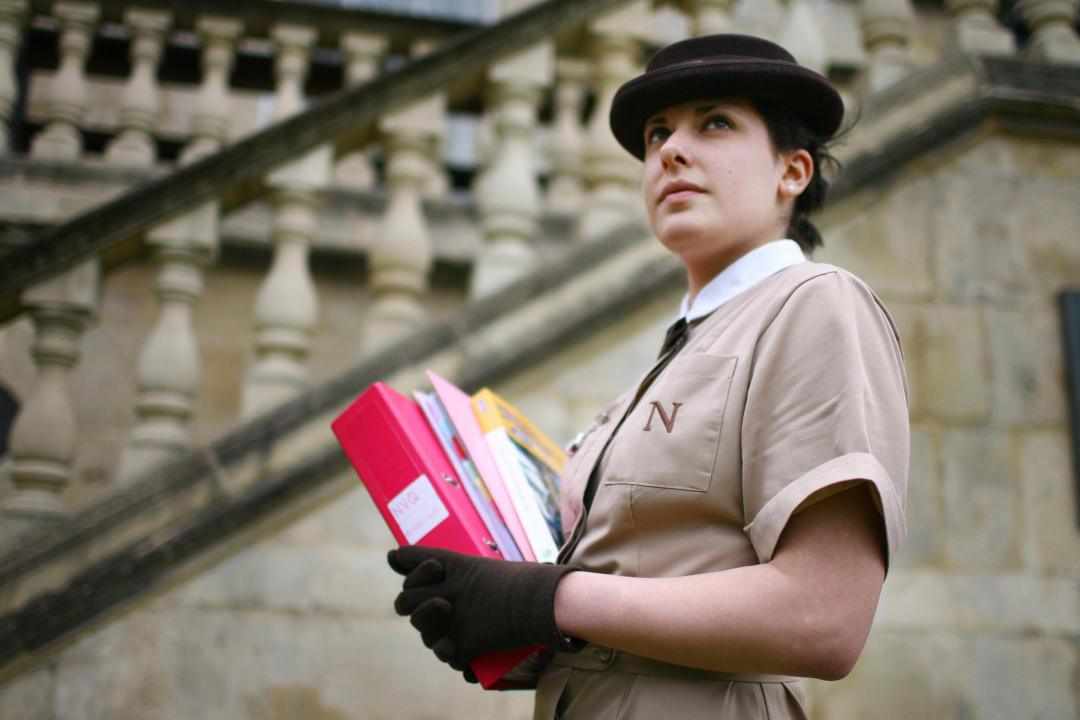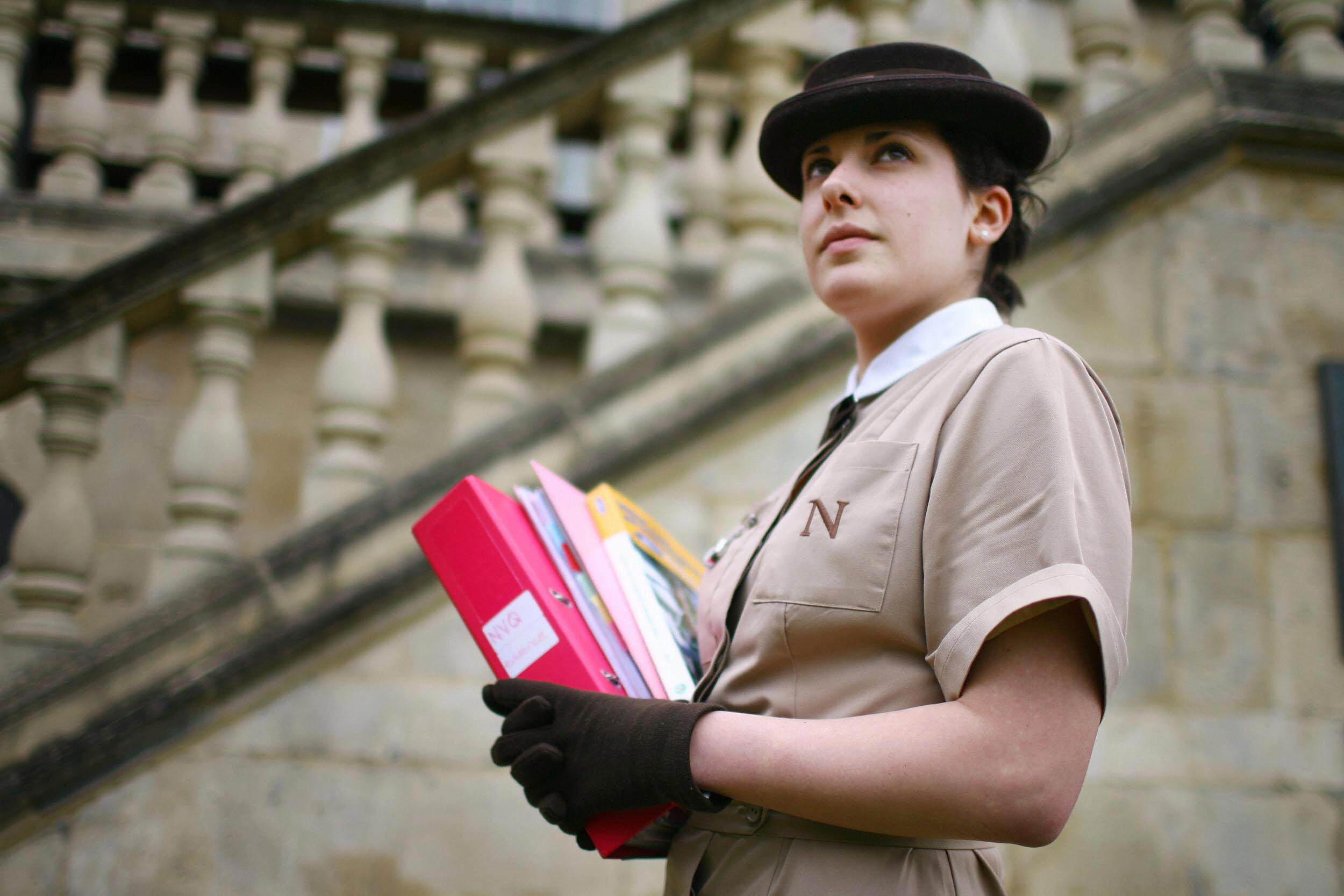The young nannies arriving for their morning lectures at Norland College in Bath make quite a sight. Although the road is empty, they bank up along the pavement waiting for the lights to change. They are in their winter uniform of brown hat and gloves, hair in a neat bun; some push old-fashioned Silver Cross prams with plastic babies in them. Eventually the green man appears and the nannies cross.
These girls look as if they are being trained for a bygone era — and that is certainly part of their appeal — but they are well prepared for modern life. Founded in London in 1892, Norland College made its name providing nannies for British aristocrats and royals. Back then, a nanny might have stayed with a family over a lifetime, but these days it’s a career, not a vocation, so it’s normal to move on every few years. As a result, the new nannies are a different breed: ambitious, smart, middle-class. Often they’ve picked Norland over university — and given how many job opportunities the qualification provides, and how much you can earn, it can be a shrewd move. Moreover, a new type of employer now requires their services: the international elite. Much like British public schools, Norland nannies have become popular with rich foreigners who are desperate to do — and pay — whatever it takes to look the part.
The Edwardian-looking college uniform has been slightly redesigned to make it more practical, with the waistlines brought in to look more attractive. The girls are constantly reminded that they are neither au pairs nor lowly servants, but something more noble. Where once some of them might have been brought up by a Norland nanny themselves, others see it as a fast track to the high life, the modern equivalent of becoming an air hostess. When in uniform they are expected to be on best behaviour, which for the most part they are — although when I visited the college last month I noticed a few Norlanders secretly shopping for Kim Kardashian-style dresses on their laptops during a seminar.
The girls spend three years on a mixture of practical sessions, lectures and placements. Extracurricular activities include a polo team and a choir. Robotic babies, which cry throughout the night, are used to simulate nursery life. Advice is given on everything from nit removal and baby baths to stopping children discovering videos of Jihadi John. The code of conduct also includes guidance on how nannies should themselves use social media, following a pretty tame tabloid story about Norland nannies going ‘wild’ during their time off, wearing skimpy outfits and drinking vodka. ‘The best cure for a hangover is to drink a banana milkshake,’ tweeted one girl at the time; exactly the kind of sensible advice you would expect from a Norlander.
In 1972, Jonathan Gathorne-Hardy published The Rise and Fall of the British Nanny, an elegy to ‘a unique and curious way of bringing up children, which vanished for ever after the second world war’. Most colleges that trained nannies died out, but Norland clung on. When a new wealthy elite arrived in Britain, business picked up. Job opportunities from all round the world are now available via Norland’s agency, and the girls are advised to choose what seems the most appealing. For some, it’s a big house in Kensington. For others, a life of exotic travel. Today’s Norland nanny now has the world’s wealthiest families clamouring to employ her, offering all kinds of perks — and what’s two weeks’ holiday in Cornwall each year compared with a private jet and houses on every continent?
In job adverts, nannies advertise their skills. Take this recent one: ‘Norland nanny able to ski, ride and sail who can teach the children to do the same. Experienced with wheat, gluten and dairy allergies.’ What more could today’s discerning parent ask for? The agency always has more jobs to fill than nannies available, so the interview process works both ways. If you want an affordable Norlander, go for a ‘Newly Qualified Nanny’, available for a modest salary of around £27,000 a year and barred from working abroad. This cuts out the foreign competition, so clued-up British parents who might struggle to afford a more experienced Norlander try to secure an NQN. Later, foreign placements can command a higher salary, with six figures not unheard of.

In days gone by, Norland nannies were prized by the English upper crust, who appreciated both their expertise and absolute discretion. So, too, do the new elite. ‘You might see what type of pyjamas your employer wears,’ warned one Norlander, but given the nature of the work they can expect to see all kinds of dirty laundry, both literal and metaphorical. A rogue nanny can be a disaster; Nigella Lawson found that out when one of hers testified against her in court. Wendi Deng’s leaked to the press that Rupert Murdoch’s household was a ‘war zone’. Neither of the nannies involved were Norlanders — if stories like these were ever linked to the college, they could sink it.
The agency knows this, so they keep things tight. If nannies need advice, they should consult Norland. It’s a clever model: via the agency, nannies have access to some of the most lucrative childcare jobs available. But it works both ways, and I imagine the agency gives short shrift to nannies who put the establishment’s reputation at risk. Sleeping with the children’s father is probably not a gamble worth taking if it means future work via the agency starts to dry up.
Nannies are expected to wear the uniform only if their employer demands it. This is unusual with British families, although more common with international employers who are keen to flaunt their Norlander. The agency does warn parents, though, that a uniformed nanny puts the children at greater risk of being kidnapped. Not that the nannies aren’t prepared for this: their training now includes lessons in self-defence and getaway driving.
While the college has a Christian foundation — evident in their motto ‘Love Never Faileth’ — Norlanders are taught to ‘respect all spiritual beliefs’. They are so popular in the Middle East that Etihad airlines now offers Norland-approved ‘flying nannies’ on some of its routes. Small wonder sheikhs and oligarchs have succumbed to their charms.
There are still a few things that Britain is thought to do better than anyone else in the world. Nannies are one, and have become yet another service this country exports to a global plutocracy. The challenge Norland faces is how to appeal to international clients while not appearing gauche to a British audience. Easier said than done. But for the time being, Norland is still a respected institution — and savvy young women are capitalising on it.








Comments